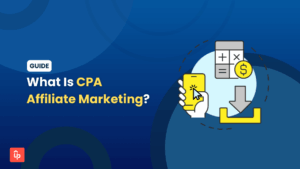In the world of affiliate marketing, traffic is king, and keywords are the keys to unlocking that kingdom. You can have the best products and the most compelling ad copy, but if no one can find your content, you’ll never make a sale. This is where affiliate marketing keyword research comes into play. It’s the essential first step that separates the most successful affiliates from those who struggle to gain traction.
Keyword research for affiliate marketing isn’t just about finding high-volume terms. It’s a strategic process of identifying what your target audience is searching for, understanding their intent, and discovering low-competition, high-value phrases that can drive qualified traffic to your site. This guide will walk you through a proven, step-by-step process to help you find the most profitable keywords and build a content strategy that converts.
What is Keyword Research for Affiliate Marketing?

In the world of affiliate marketing, keywords are the bridge between your content and your potential customers. Keyword research is the process of discovering and analyzing the search terms that people type into Google, Bing, YouTube, or even TikTok when they’re looking for information, reviews, or products.
For affiliate marketers, keyword research isn’t just about chasing traffic—it’s about identifying the exact queries that lead to clicks, conversions, and ultimately commissions. If someone types in “best running shoes for flat feet” or “VPN for Netflix in 2026”, they’re not just browsing—they’re looking to solve a problem. If your content ranks for that keyword, you’re positioning yourself right at the decision-making stage.
Think of keyword research as your market research. Instead of guessing what your audience wants, you can look directly at what they’re searching for every single day.
Why is Keyword Research Important?
Many affiliate marketers fall into the trap of creating content without first understanding what their audience is searching for. They write articles, reviews, or guides based on what they think people want, only to find their content gets no traffic, their videos get a handful of views, and their affiliate links remain unclicked.
This is where keyword research comes in. It’s the strategic foundation for all your content, ensuring that your efforts lead to tangible results. Here’s why it’s so crucial:
Attract the Right Traffic
Your content is invisible if it doesn’t target the words and phrases people use in search engines. By doing keyword research, you can pinpoint the exact terms your potential audience is typing. This gives you a clear and direct path to attracting organic traffic to your site or channel.
Find Your Buyers
Not all searches are created equal. A person looking up “history of running shoes” is likely looking for information and isn’t ready to buy. On the other hand, someone searching for “best budget running shoes under $100” is actively looking to make a purchase. Keyword research helps you distinguish between informational searches and those with commercial or transactional intent. Targeting these high-intent keywords is key to generating revenue.
Gain a Competitive Edge
The affiliate marketing landscape is highly competitive. Larger publishers and established blogs often dominate the most popular search terms. However, smart keyword research allows you to discover long-tail keywords—longer, more specific phrases that have less competition. Focusing on these niche opportunities can help a smaller site or creator outrank bigger players and attract a loyal audience.
Maximize Your Time and Effort
Imagine the difference between writing 50 random articles and hoping one ranks versus creating 10 targeted pieces that you know will attract traffic. Keyword research helps you work smarter, not harder. It ensures that every piece of content you create is a strategic investment, saving you from wasting valuable time and money on content that will never perform.
Who Can Benefit From Doing Keyword Research?
Keyword research isn’t just for SEO specialists; it’s a vital tool for all kinds of marketers and businesses. Here are some examples of who can benefit:
New Businesses and Affiliates
If you’re just starting an e-commerce store or affiliate site, keyword research is the first step. It helps you find out exactly what products people are searching for, so you can make sure you’re selling things people actually want to buy.
For example, if you’re launching a Shopify store selling pet products, keyword research can tell you if people are looking for “dog puzzles” or “cat harnesses” more often.

Content Creators and Bloggers
Content creators can use keyword research to find topics that attract both readers and affiliate opportunities. For instance, a food blogger writing about “easy weeknight dinners” could discover that people are also searching for “meal prep containers” or “air fryer recipes,” creating new chances to promote related products and earn commissions.

Businesses and Brands
Even established businesses and brands can benefit from keyword research. A software company, for example, can use it to create a content strategy that helps affiliates understand what to target. It can also help the company optimize its own website content to attract more organic traffic and customers.
Experienced Affiliates
If you’re already earning commissions but want to grow, keyword research can help you scale. It uncovers new, high-value keywords and topics that you can use to expand into new product categories or niches, helping you increase your earnings.
Getting Started With Keyword Research
Getting started with keyword research doesn’t require expensive tools. You can begin with free and simple methods to find valuable keywords for your content.
1. Use Free Keyword Tools
Tools like Google Keyword Planner, Ubersuggest, and AnswerThePublic are excellent for generating initial keyword ideas. Although they may not offer the most in-depth data, they are perfect for brainstorming.
For example, typing “affiliate marketing” into AnswerThePublic will give you a list of question-based queries people are searching for, such as “how to start affiliate marketing with no money” or “is affiliate marketing worth it in 2026.” These questions are fantastic opportunities to create targeted content.
2. Analyze Your Own Website
Check Google Search Console to see which keywords you’re already ranking for. You might discover a post on your site is on the second page of Google for a valuable keyword. By simply updating and optimizing that article, you could push it to the first page and significantly increase your traffic.
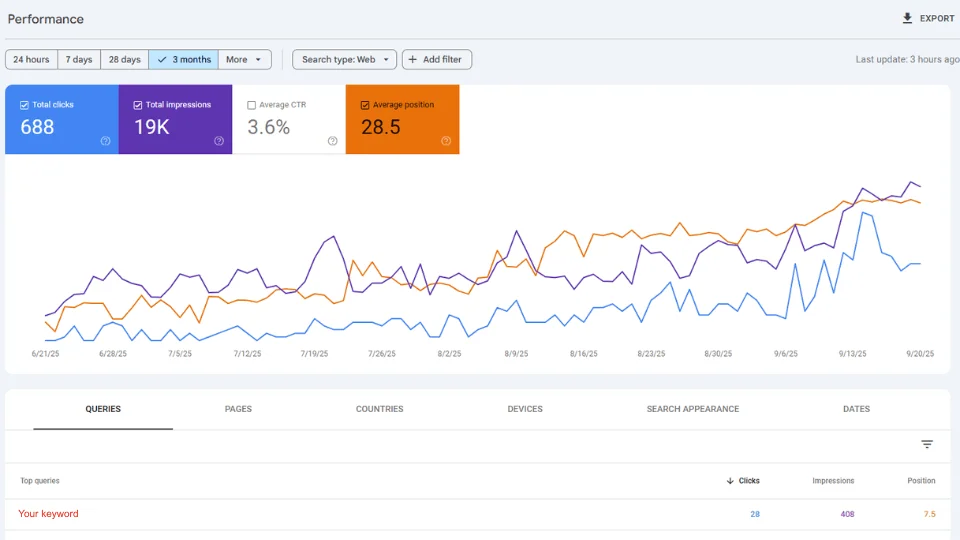
3. Examine Your Competitors
Find out what keywords your competitors are ranking for. If you run a blog about affiliate marketing for SaaS products, see what terms other successful SaaS affiliate blogs are ranking for. Tools like Ahrefs and SEMrush are great for this, as they can show you where your competitors are getting their traffic.
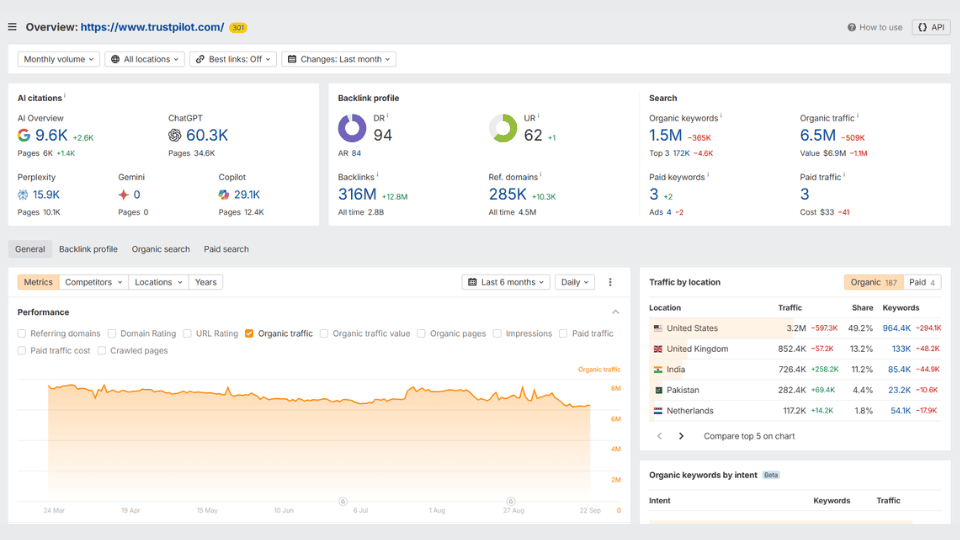
Ahrefs
4. Study Your Niche
Forums, subreddits, Quora, and Facebook groups are often overlooked but are great sources of keyword inspiration. Pay attention to the questions people are asking in your niche. If you’re in the gaming space and constantly see people asking about “best gaming mouse for small hands,” you’ve found a great keyword opportunity for a new article.
Types of Keywords
Not all keywords are the same. Understanding the differences helps you create the right kind of content.
Matching Terms
These are direct matches of what users search for.
Example: “best red dot sight for AR-15.”
Related Terms
These are variations or synonyms.
Example: If your main keyword is “hiking backpack”, related terms might be “trekking bag” or “daypack for hiking.”
Keyword Clusters
Instead of targeting one keyword per article, group related ones.
Example: An article on “best budget smartphones 2026” can also rank for “cheap android phones”, “phones under $300”, and “affordable smartphones.”
Keyword Intents
- Informational: “What is affiliate marketing?”
- Commercial: “Best SEO tool for affiliates.”
- Transactional: “Buy SEMrush coupon.”
- Navigational: “Amazon affiliate login.”
For affiliates, commercial and transactional keywords are the money-makers.
Keyword SEO Metrics Explained
When evaluating keywords, don’t stop at search volume. Metrics tell you how profitable a keyword might be.
Search Volume
The number of monthly searches. A keyword with 5,000 searches may look tempting, but it could be very competitive. Sometimes 200–500 search keywords are more valuable if they’re buyer-focused.
Traffic Potential
The real amount of traffic an article can attract. A single page can rank for dozens of related terms, so “traffic potential” is often higher than “search volume.”
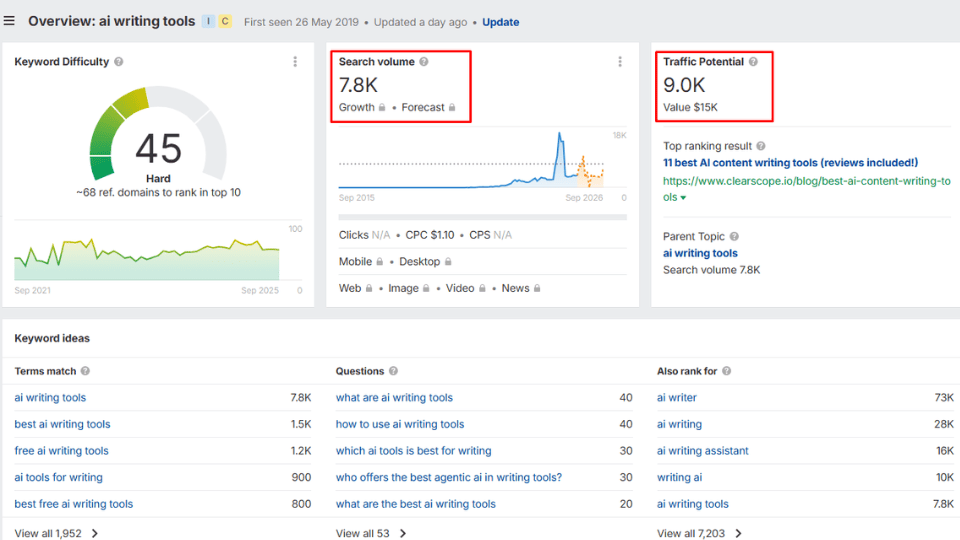
Keyword Difficulty (KD)
A score that shows how hard it is to rank for a keyword. For new affiliate sites, target KD under 30.
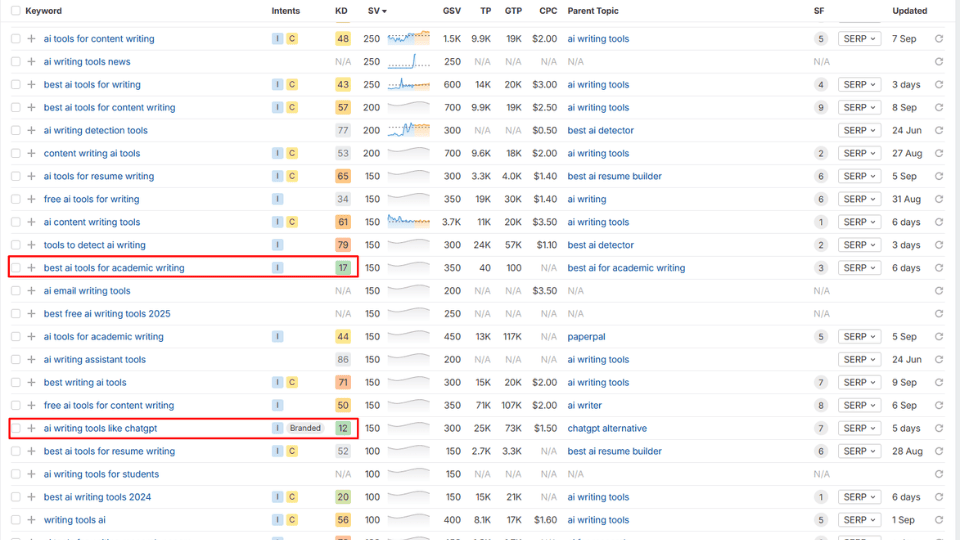
Cost Per Click (CPC)
A high CPC usually signals high commercial value. For example, “VPN for Netflix” may have a $10+ CPC, meaning advertisers pay big because the keyword converts.
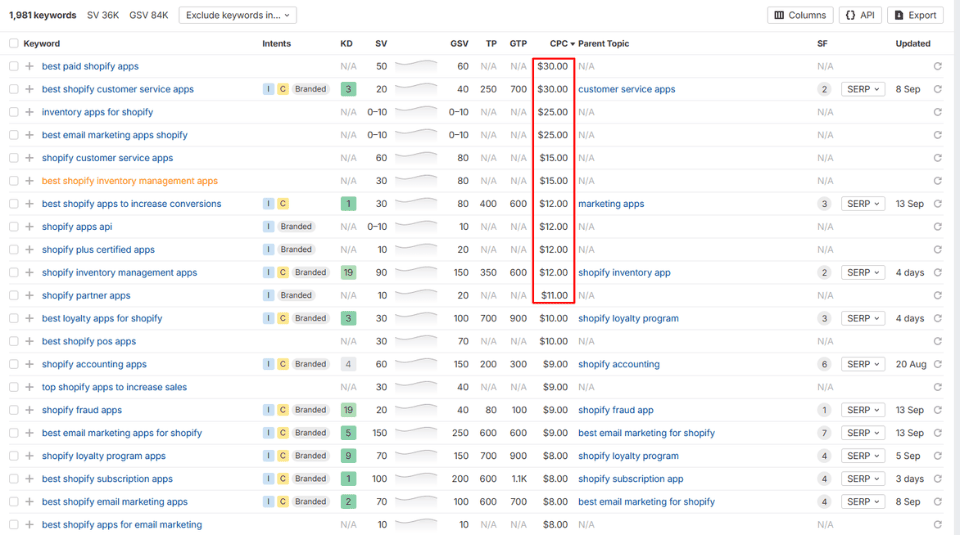
Growth
Look for keywords trending upwards. In 2024, “AI writing tools” exploded. Affiliates who caught that early won big.
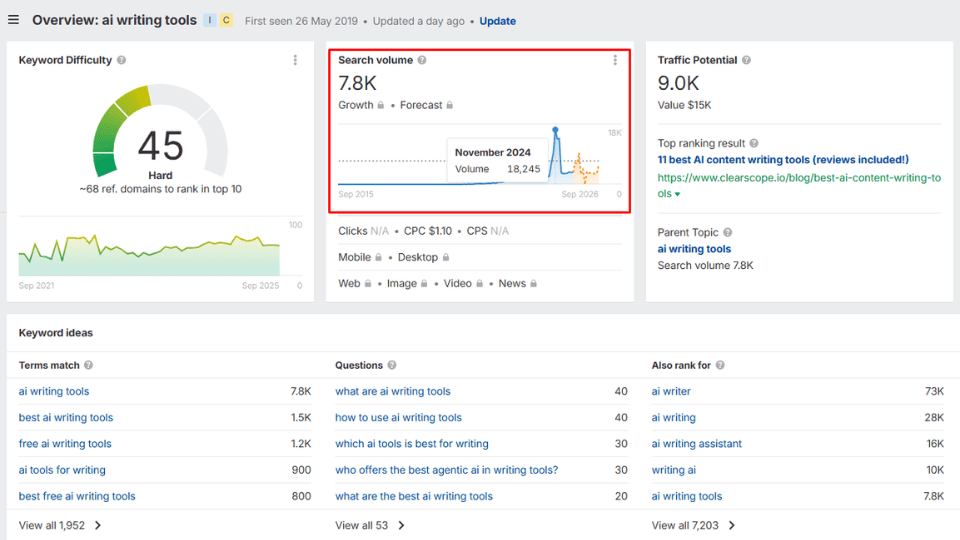
Business Potential
Does the keyword directly connect to what you’re promoting?
If you run an affiliate blog about eco-friendly products, chasing “cheap plastic cups” makes no sense, no matter the volume.
How to Do Affiliate Marketing Keyword Research (Step-by-Step)
Now let’s put it all together into a repeatable process.
Step 1: Select a Niche for Your Content
Choose a niche with buying intent. Fitness, finance, SaaS, and travel are proven winners.
Example: In the travel niche, targeting “best travel insurance for digital nomads” is far more profitable than just “travel insurance.”
Step 2: Think About the Search Intent
Ask: “What does this person want?” If they type “how to tie a tie,” they want a tutorial, not a product. If they type “best silk ties under $50,” they’re ready to buy.
Step 3: Decide What Type of Affiliate Keywords to Target
Focus on:
- Best + [Product] + [Qualifier] → “best VPN for Netflix 2026”
- [Product] vs [Product] → “Shopify vs. Printify”
- Review-based → “[Product] review”
- Problem-solving → “how to stop snoring naturally” (with affiliate sleep aids as solution)
Step 4: Pick a Keyword Research Tool
If you’re starting out, free tools work. Once you earn, invest in Ahrefs, SEMrush, or Jaaxy. These tools save months of trial and error.
Step 5: Understand the Metrics When Researching Keywords
Always weigh traffic vs. competition vs. buyer intent. A keyword with 200 searches but high intent is better than 5,000 searches with low intent.
Step 6: Analyze Your Competitors
Check who’s ranking in the top 10. Are they big publishers, or small blogs? If it’s big names only, find a longer-tail variation.
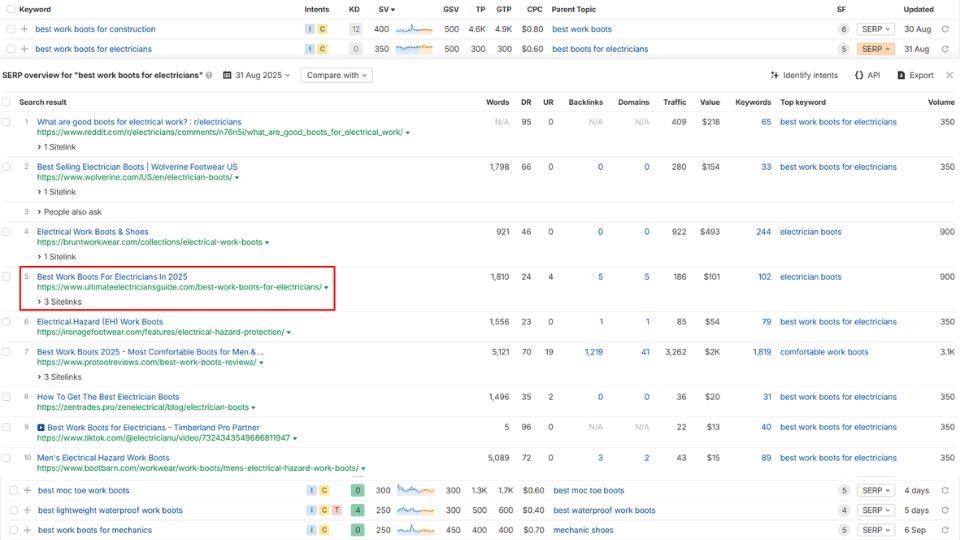
Keyword Research Tips for Affiliate Marketing
Affiliate marketing keyword research is not just about plugging terms into a tool and exporting a list. It’s about using strategy and critical thinking to find opportunities others miss.
Evaluate Your Current Keyword Performance
Before chasing new opportunities, assess what’s already working. Use Google Search Console or Ahrefs to track which posts bring traffic. Often, existing content has “low-hanging fruit” keywords sitting at position #11–20.
With a content update (adding FAQs, refreshing product links, or improving visuals), you can push these into the top 10.
Example: If your article on “best budget cameras for YouTube” ranks #12 for “cheap YouTube cameras under $500,” expanding that section with more detailed product reviews may be enough to grab page one.
Ensure Your Keywords Are Benefitting the Customer
Avoid chasing high-volume terms that don’t help readers.
Always ask: “Will targeting this keyword allow me to give value and solve a problem?”
- Bad keyword: “camera history timeline.” (informational, low conversions)
- Good keyword: “best DSLR for wedding photography 2026.” (buyer-focused, high conversions)
Watch What Your Competitors Rank For
Competitor analysis is one of the most powerful strategies. Look at smaller blogs in your niche, not just giants. If a competitor with 200 backlinks ranks for “best home espresso machine under $300,” there’s a good chance you can compete with better content.
Ask Your Customers Questions
If you already have an audience (email list, social media, YouTube comments), ask them directly:
- “What’s your biggest struggle with X product?”
- “What alternatives are you considering?”
The language they use often reveals new keyword opportunities.
Keyword Research Tools for Affiliates
Finding the best keyword research tool for affiliate marketing depends on your specific needs, budget, and experience level. While many tools serve a general SEO purpose, the best ones for affiliates offer features that help you identify keywords with high commercial intent and low competition.
Here are some of the best keyword research tools for affiliates, categorized by their strengths:
All-in-One SEO Suites (Best for Comprehensive Data)
These tools offer a complete suite of features beyond just keyword research, including competitor analysis, backlink checks, and site audits. They are generally more expensive but provide the most in-depth data.
SEMrush: Widely considered an industry leader, SEMrush offers a robust “Keyword Magic Tool” for finding keyword ideas and a “Keyword Gap” tool to see what keywords your competitors rank for that you don’t. It provides detailed metrics like search volume, keyword difficulty, CPC, and search intent. This is ideal for affiliates who want to dominate their niche and understand their competition deeply.
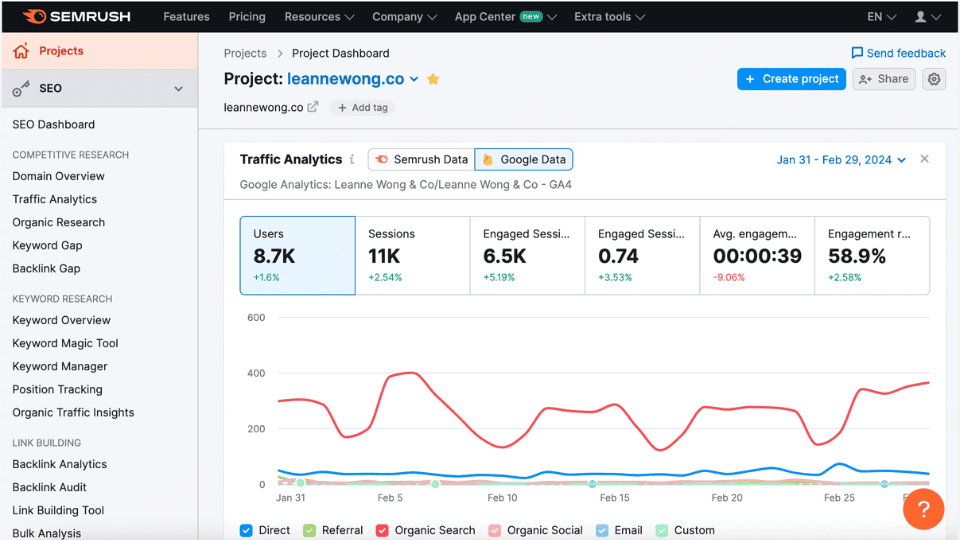
Ahrefs: Ahrefs is renowned for its accurate clickstream data and extensive backlink database. Its “Keywords Explorer” helps you find lucrative keywords by showing not just search volume but also the number of actual clicks, which is crucial for affiliate content. You can also analyze the SERP history to see how results have changed over time.
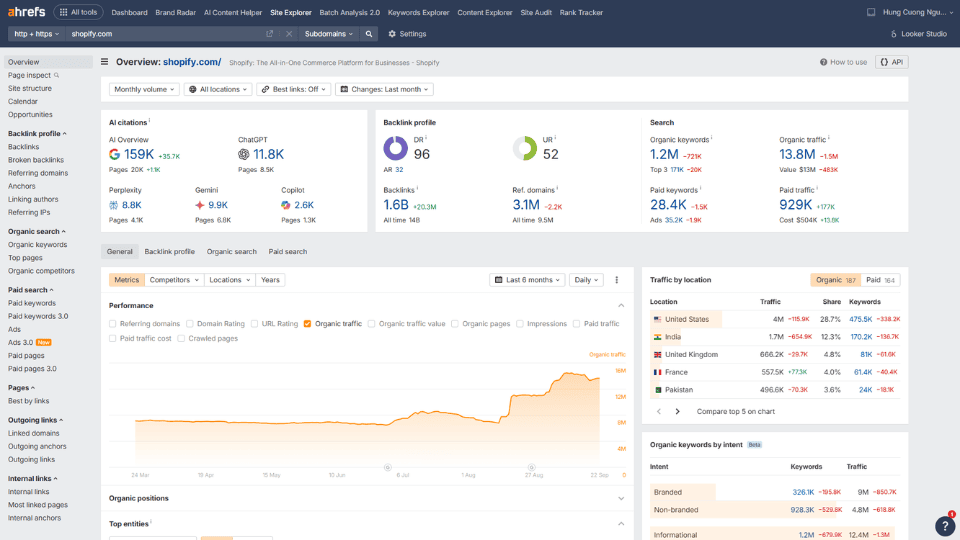
SE Ranking: A strong, often more budget-friendly alternative to SEMrush and Ahrefs. SE Ranking offers a complete set of tools for keyword research, competitor analysis, and rank tracking, making it a well-rounded option for affiliates.
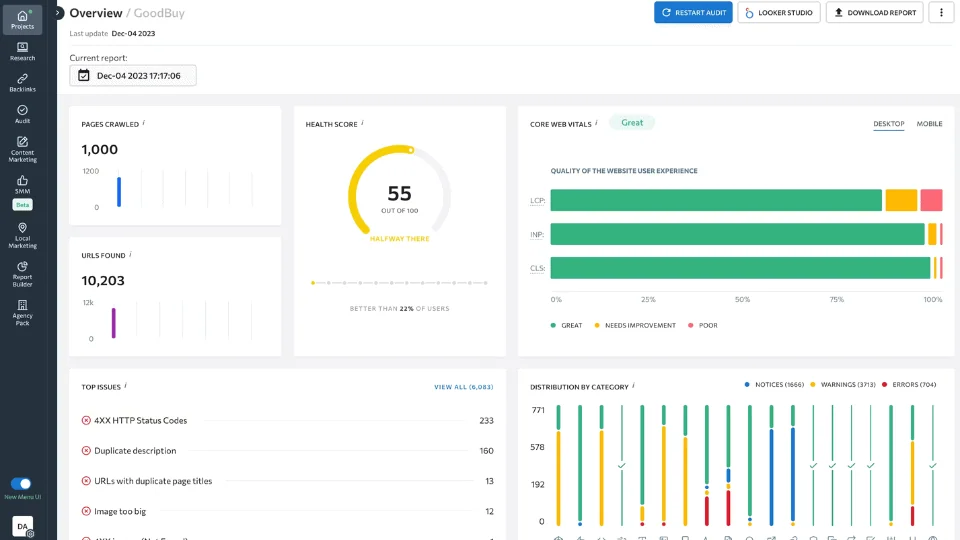
Long-Tail Keyword Specialists (Best for Niche Affiliates)
These tools are specifically designed to help you uncover low-competition, long-tail keywords that are easier to rank for and often have high commercial intent.
KWFinder (Mangools): This tool is celebrated for its user-friendly interface and focus on finding long-tail keywords with low SEO difficulty. Its color-coded difficulty score makes it easy to spot opportunities. KWFinder is a great choice for content creators and affiliates operating on a smaller budget.
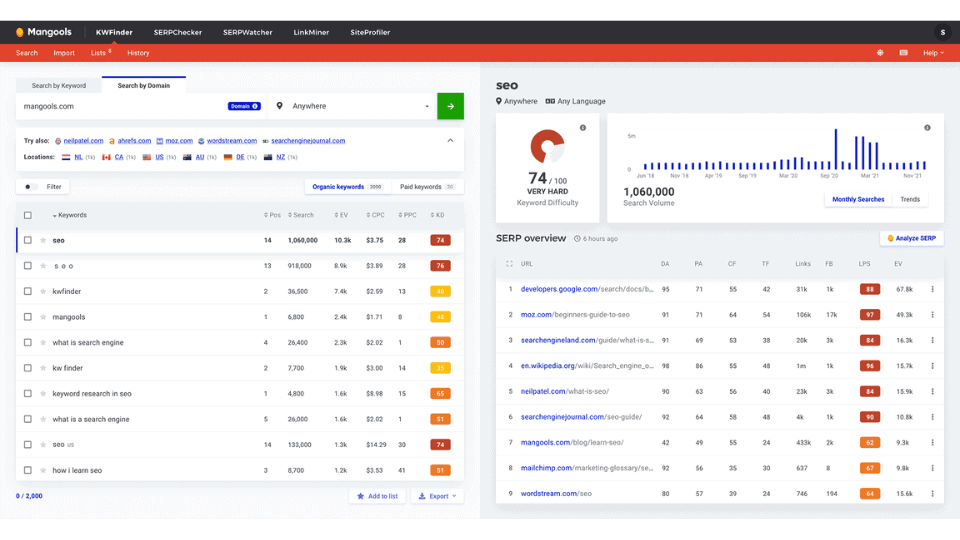
LongTailPro: Built specifically for scaling long-tail research, this tool helps you process hundreds of seed keywords at once. It provides a unique “Keyword Competitiveness” score and even profitability estimates, which is a major plus for affiliates focused on conversions.
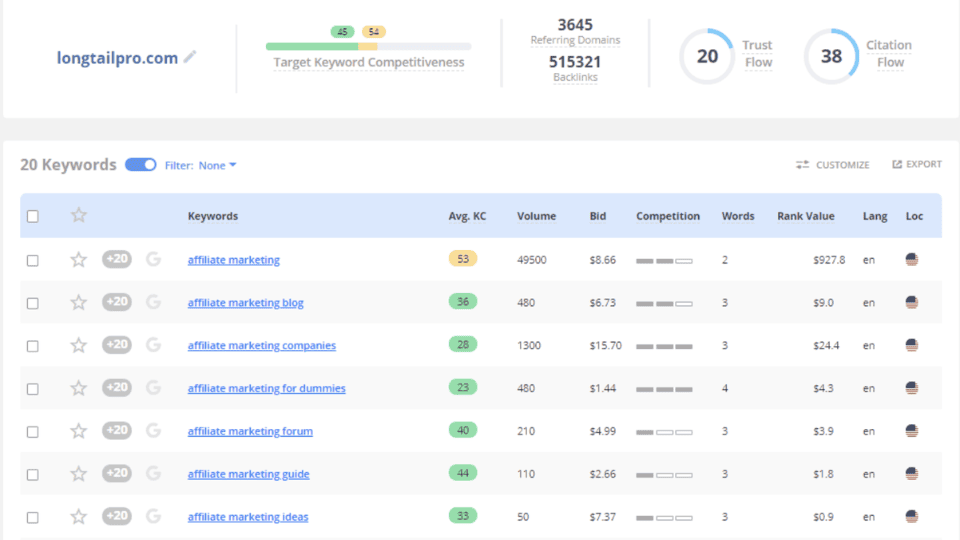
LowFruits: This is a specialized tool that focuses on finding “weak” or low-competition keywords you can rank for. It analyzes Google’s autocomplete and the SERP to find keywords where you can compete with a new or small site.
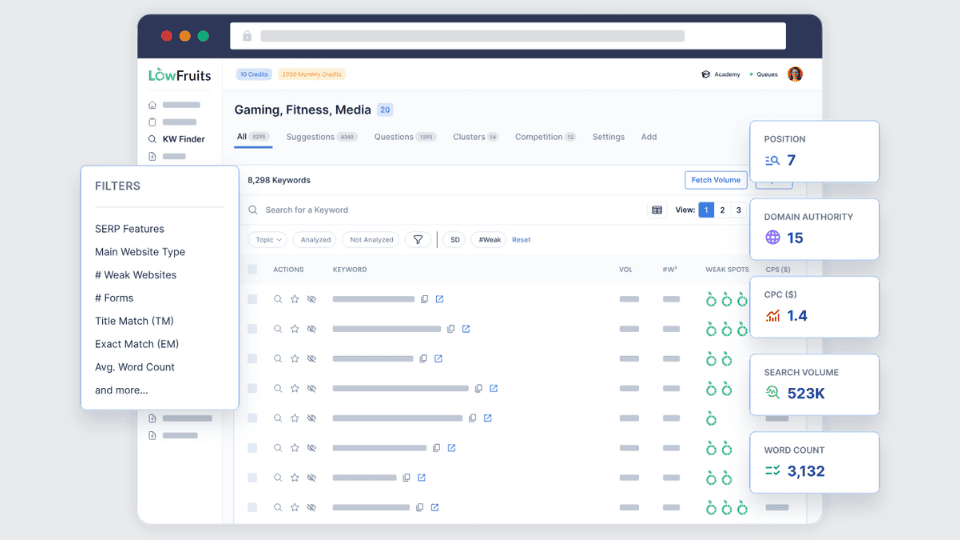
Free and Freemium Tools (Best for Beginners or Budget-Conscious Affiliates)
These tools are either completely free or offer a generous free plan, making them perfect for those just starting out in affiliate marketing.
Google Keyword Planner: As Google’s official tool, it’s free to use for anyone with a Google Ads account. While it’s primarily for paid advertising, it provides essential baseline data on search volume and competition. The data is provided in ranges, which can be a limitation, but it’s an excellent starting point.
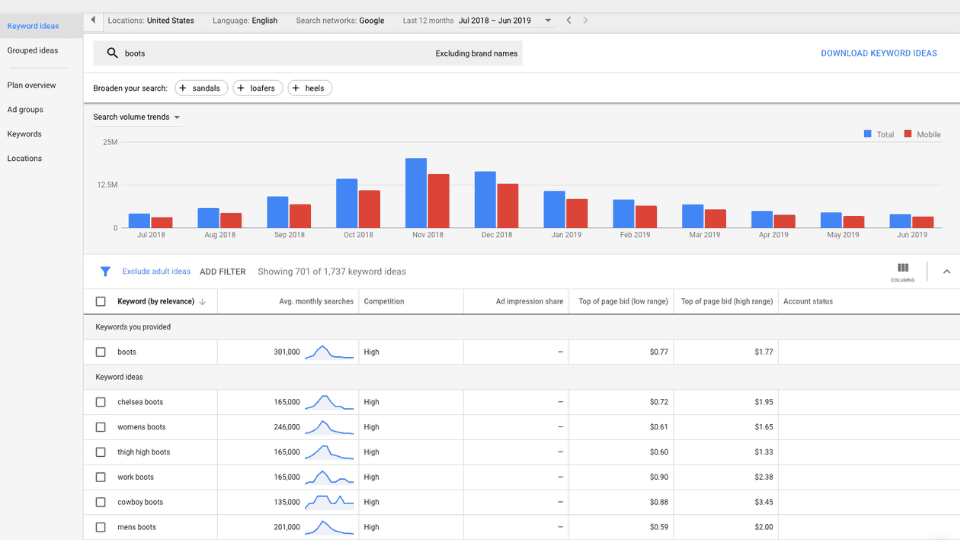
AnswerThePublic: This tool visualizes questions, prepositions, and comparisons related to a seed keyword. It’s fantastic for generating content ideas that directly answer a user’s question, which is a key strategy for affiliate blogs and review sites.
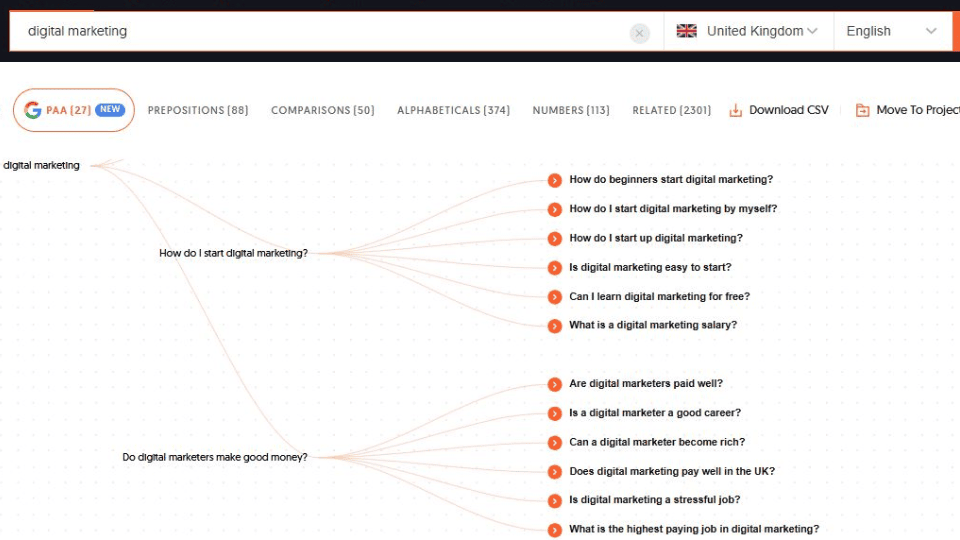
KeywordTool.io: This tool uses Google’s Autocomplete feature to generate hundreds of long-tail keyword suggestions. The free version provides a good number of ideas, and the paid version adds more data like search volume and competition.
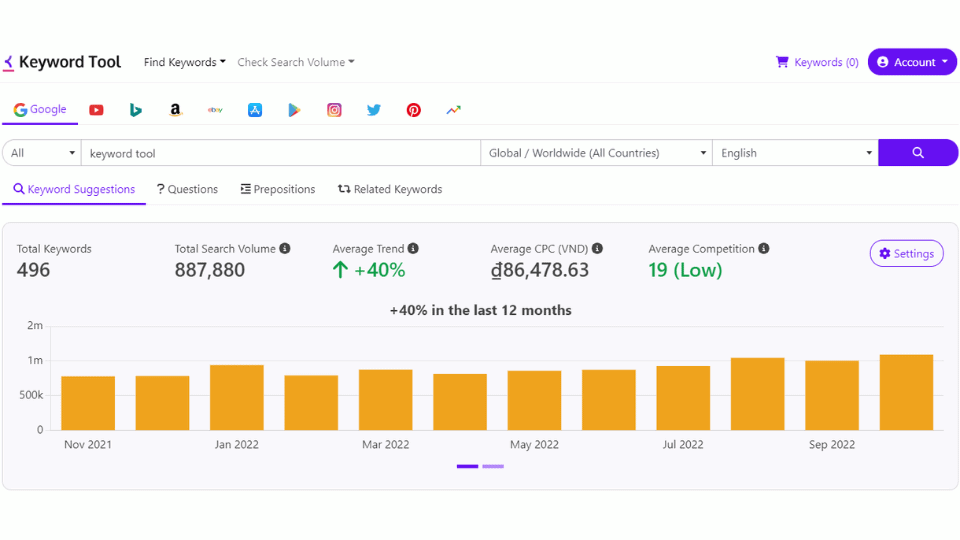
5 Key Features of an Affiliate Marketing Tool
An affiliate marketing tool is a software or platform that helps businesses and individuals manage, track, and optimize their affiliate marketing campaigns. These tools are crucial for both merchants running a program and affiliates promoting products.
Here are the key features of a robust affiliate marketing tool:
1. Comprehensive Tracking and Analytics
- Real-Time Tracking: This is a fundamental feature that allows you to monitor clicks, conversions, sales, and leads as they happen.
- Multi-Channel/Cross-Device Tracking: A good tool can track affiliate-driven actions across different channels (websites, social media, email) and devices (desktop, mobile).
- Customizable Reporting: Detailed reports should be available to analyze key performance indicators (KPIs) like revenue, conversion rates, and traffic sources, allowing for data-driven decisions.
- Link Management: Tools for creating, cloaking, and managing affiliate links, which can also help track which specific content or location is generating the most clicks.
2. Affiliate Management and Communication
- Automated Onboarding: Streamlines the process of recruiting and approving new affiliates, including automated welcome emails and access to marketing materials.
- Partner Recruitment: Features that help you find and connect with new affiliates, sometimes through built-in marketplaces or directories.
- Flexible Commission Structures: The ability to set up various commission models, such as percentage-based, fixed fees, tiered commissions, or recurring payments (for subscriptions).
- In-Platform Communication: Provides a way to easily communicate with your affiliates, share updates, and provide support.
3. Payment and Payouts
- Automated Payouts: Simplifies and automates the process of paying commissions to affiliates accurately and on time, often with integrations for platforms like PayPal.
- Fraud Prevention: Essential for protecting your program from fraudulent clicks, leads, or sales. This feature helps ensure you only pay for legitimate conversions.
4. Customization and Integrations
- Branded Interface: Allows you to customize the affiliate dashboard and other user interfaces with your own branding, providing a professional and cohesive experience for your partners.
- Seamless E-commerce Integration: Integrates easily with popular e-commerce platforms like Shopify, WooCommerce, and Magento, as well as payment gateways like Stripe.
- API and Automation: Provides an API to connect with other marketing tools and systems, enabling advanced automation of workflows and data synchronization.
5. Marketing and Creative Assets
- Creative Asset Management: A centralized library where you can provide affiliates with a variety of promotional materials, such as banners, text links, videos, and product images.
- Customizable Affiliate Links: Allows affiliates to create custom, unique links to track their specific promotions.
By utilizing a tool with these key features, businesses can efficiently manage their affiliate programs, foster strong relationships with partners, and optimize their marketing efforts for maximum return on investment (ROI).
How to Use Your Affiliate Marketing Keyword Research
1. Map Keywords to Your Content
The first step is to match your keywords to the right kind of content. Think about why someone is searching for a particular term.
Informational Keywords: People use these to find answers or learn something new. These are perfect for blog posts, how-to guides, and tutorials.
- Keyword: “how to start a garden“
- Content: A blog post titled “A Beginner’s Guide: How to Start a Garden from Scratch.”
- Content: A video tutorial on “The 5 Easiest Plants to Grow for First-Time Gardeners.”
Transactional Keywords: These indicate a user is ready to buy. Use these for product pages, service pages, and your home page.
- Keyword: “best budget running shoes“
- Content: A category page on your e-commerce site showing all running shoes under a certain price.
- Content: A product page for a specific shoe, with a title like “Nike Revolution 6 Men’s Running Shoes.”
Commercial Investigation Keywords: These show a user is researching before a purchase. They work well for comparison articles and product reviews.
- Keyword: “Tefal vs. Ninja air fryer“
- Content: A blog post titled “Tefal vs. Ninja: Which Air Fryer is Right for You?“
- Content: A product review page that highlights the features, pros, and cons of a specific air fryer model.
2. Implement Keywords Naturally
Once you have a content idea, it’s time to place your keywords. The goal is to make it sound natural, not forced. Search engines are smart and can recognize synonyms and related terms, so don’t just repeat the exact same phrase over and over.
Title Tag: This is the most important place to include your primary keyword.
- Bad Example: “Running Shoes. Buy Best Running Shoes. Running Shoes for Sale.“
- Good Example: “The 10 Best Running Shoes for Beginners in 2026.“
Headings (H1,H2,H3, etc.): These break up your content and signal what each section is about.
- H1: “How to Make the Perfect Chocolate Chip Cookies”
- H2: “Gathering Your Ingredients: What You’ll Need”
- H2: “Mixing the Dough: Step-by-Step Instructions”
- H3: “The Secret to Perfect Cookie Texture”
Body Content: Sprinkle your keywords and related terms throughout the text.
- If your keyword is “dog training tips,” you can also use phrases like “how to train your dog,” “puppy obedience,” and “behavioral training techniques.” This makes the content more comprehensive and natural.
URL: A clean, descriptive URL helps with both SEO and user experience.
- Bad Example:
yourwebsite.com/product/p12345 - Good Example:
yourwebsite.com/blog/how-to-start-a-garden
Image Alt Text: This text describes an image for search engines and visually impaired users.
- Image: A picture of a golden retriever puppy sitting nicely.
- Alt Text: “A golden retriever puppy sitting patiently during a dog training session.”
3. Analyze and Refine Your Strategy
Finally, using keywords is an ongoing process. You need to see what’s working and what’s not.
- Find New Opportunities: Use tools like Google Search Console to see which keywords your site is already ranking for. Maybe you wrote a blog post about “healthy dinner recipes” and you’re also getting traffic for “quick weeknight meals.” You can then optimize that page or create a new one to target that new keyword specifically.
- Competitor Research: Look at the keywords your competitors are ranking for. If your top competitor is getting a lot of traffic from the keyword “meal prep ideas for families,” but you haven’t written about it yet, that’s a perfect opportunity for a new piece of content.
How to Prioritize Keywords
Prioritizing keywords for affiliate marketing is a crucial step in ensuring your content drives traffic and, more importantly, conversions. Simply targeting high-volume keywords isn’t enough; a strategic approach is needed to identify keywords that are both valuable and attainable.
Here’s a breakdown of how to prioritize keywords for affiliate keyword research:
1. Evaluate Keyword Metrics
The foundation of prioritization is a data-driven analysis of key metrics. You’ll need a keyword research tool (like Ahrefs, SEMrush, or Google Keyword Planner) to gather this information.
- Search Volume: This is the average number of times a keyword is searched for per month. While a higher volume suggests a larger audience, it also often means more competition. Look for a balance—keywords with enough volume to be worth your time but not so high that you have no chance of ranking.
- Keyword Difficulty (KD): This metric estimates how hard it will be to rank on the first page of search results for a given keyword. It’s often based on the number and quality of backlinks the top-ranking pages have. For a new affiliate site, prioritize keywords with low-to-moderate difficulty to gain initial traction. As your site’s authority grows, you can tackle more challenging keywords.
- Cost Per Click (CPC): While primarily an advertising metric, a high CPC can indicate that a keyword has high commercial value. Businesses are willing to pay more for clicks on these keywords because they lead to sales. This can be a strong signal for a profitable affiliate keyword.
2. Prioritize by Search Intent
Understanding the user’s intent is arguably the most important factor in affiliate keyword prioritization. You want to target users who are ready to buy. Keywords can be categorized into four main types of intent:
- Informational: The user is looking for information (“how to,” “what is,” “guide“). These keywords are great for building trust and authority, but they are less likely to lead to an immediate sale. Use them for blog posts, tutorials, and guides that include affiliate links.
- Navigational: The user wants to find a specific website or brand (“Amazon,” “Nike store“). These are generally difficult to rank for and not a priority for affiliate content.
- Transactional: The user is ready to buy (“buy,” “discount,” “order,” “price“). These are the most valuable keywords for affiliate marketers as they have the highest conversion potential.
- Commercial Investigation: The user is researching products before a purchase (“best,” “review,” “vs,” “comparison“). These are a goldmine for affiliate marketers. People searching with this intent are actively comparing options and looking for recommendations, making them highly receptive to affiliate offers.
Prioritization Strategy: Focus on commercial investigation and transactional keywords first. These are your “money keywords.” Once you have content targeting these, you can expand to informational keywords to build topical authority and capture a wider audience.
3. Focus on Long-Tail Keywords
Long-tail keywords are longer, more specific phrases (e.g., “best running shoes for flat feet” vs. “running shoes“). They are a cornerstone of a successful affiliate keyword strategy for several reasons:
- Lower Competition: Long-tail keywords often have less competition, making it easier for a new site to rank.
- Higher Conversion Rates: The specificity of a long-tail keyword means the user’s intent is very clear. They are often further down the buyer’s journey, making them more likely to convert.
- Build Authority: By targeting a cluster of long-tail keywords around a topic, you can build topical authority, which helps you rank for broader, more competitive keywords over time.
4. Analyze the Competition
Before committing to a keyword, analyze the existing search engine results page (SERP) to see who is already ranking.
- Identify Competitors: Note which websites are consistently ranking for your target keywords. Are they massive brands and authority sites, or are they other affiliate marketers and smaller blogs?
- Evaluate Content: Look at the type of content that is ranking. Are they product reviews, comparison tables, how-to guides, or listicles? This tells you what Google believes is the most helpful and relevant content for that search query.
- Find Gaps: Can you create a better, more comprehensive, or more unique piece of content than what’s currently available? Identify opportunities where the existing content is outdated, not thorough enough, or lacks key information.
Putting It All Together: A Prioritization Framework
- Brainstorm Seed Keywords: Start with broad topics in your niche (e.g., “coffee machines,” “camping gear“).
- Expand with a Tool: Use a keyword research tool to generate hundreds of keyword ideas from your seed keywords.
- Filter by Intent: Group keywords by their search intent. Create separate lists for Commercial Investigation, Transactional, and Informational keywords.
- Analyze and Score: For each keyword, note its Search Volume, Keyword Difficulty, and CPC.
- Prioritize the “Sweet Spot”: Look for keywords that have a good balance of:
- Commercial or Transactional Intent
- Reasonable Search Volume
- Low to Moderate Keyword Difficulty
- Check the SERP: Do a manual search for your top-priority keywords to ensure the ranking pages are beatable and the content type aligns with your strategy.
FAQs
How do I find good keywords for affiliate marketing?
Start with tools like Ahrefs, SEMrush, or Jaaxy. Look for “best,” “review,” and “vs” keywords with clear buying intent.
How do you start keyword research?
Pick a niche → brainstorm terms → test free tools → analyze competitors → invest in premium tools once you’re ready to scale.
What is an example of keyword research in affiliate marketing?
If you promote VPNs, you might start with “VPN for Netflix”, expand to “VPN for Disney+,” then build content clusters around streaming + VPN keywords.
Conclusion
Keyword research is the foundation of affiliate marketing success. It tells you what people want, where they look, and how you can position your content to solve their problems.
- New affiliates can start with free tools and simple long-tail keywords.
- Experienced affiliates should invest in tools like Ahrefs and SEMrush for deeper insights.
- Always focus on intent over volume—a keyword with 300 searches and high buying intent can earn more than a 10,000 search keyword with no conversions.
Whether you’re building a blog, a YouTube channel, or a TikTok presence, affiliate marketing keyword research guides your strategy.


